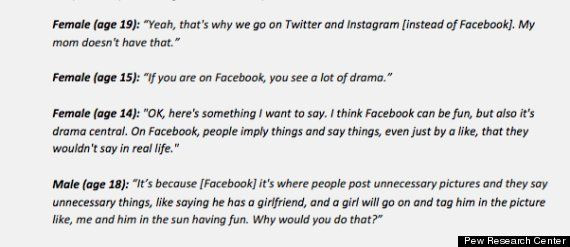Teens Find Deleting Facebook 'Liberating': Pew Study

A new study suggests that teens see Facebook as more of a "social burden" than a fun place to interact with friends and classmates, which may confirm the concerns of investors in the company who say that Facebook's popularity is waning among teens and young adults.
"While Facebook is still deeply integrated in teens' everyday lives, it is sometimes seen as a utility and an obligation rather than an exciting new platform that teens claim as their own," concluded researchers at the Pew Research Center.
The report that was released Tuesday, entitled "Teens, Social Media and Privacy," surveyed 802 teens between the ages of 12 and 17 last September.
Researchers found that teens keep their Facebook profiles as necessary placeholders, but flock to Instagram and Twitter to express themselves and interact with friends. This could be for a number of reasons, but researchers speculate that as more parents become familiar with Facebook, teens are fleeing the site for less parent-friendly options. In addition to concerns about parental monitoring, quite a few teens expressed an aversion to the "drama" that Facebook brings. They complained about people who place lengthy, emotional posts on their profiles and said the site is overrun with pictures and "unnecessary" updates.
It's not surprising that teens express seeing Facebook as a social burden. Long, drawn-out updates and 300-count photo albums are slowly but surely being replaced by social media platforms that offer more of a snapshot view of one's life, in 140-characters like Twitter or in a single photo like Instagram.
But the sites with shorter updates offer their own set of complex issues. "Fear of Missing Out," or FoMO, occurs when people feel an almost-obsessive need to check their social media pages for fear that thay will miss something important. It occurs with Facebook users, too. But with the nature of sites that offer shorter updates, it is far more common for people to continuously check their social media pages.
"We have to learn new skills to control our usage and enjoy social media in moderation," Dr. Andy Przybylski, lead researcher on the first study of FoMO, said. "Until we do, it creates a double-edged sword aspect to social media."
Maybe the teens in the Pew Survey who reported weaning themselves off of certain social media platforms, specifically Facebook, were onto something. As more and more people depend on social media as part of their social development, new disorders and dangerous behaviors (like distracted driving) increase.
Teens in the study said that Facebook can offer both positive social support and negative social expectations. Those who said they deleted their Facebook pages found the experience "liberating."



























